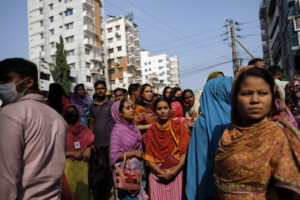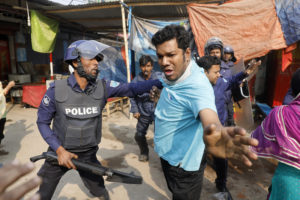Smile, Work and Die
The 300-plus people killed in the collapse of a garment factory in Bangladesh this week were not lost to an accident, but are among the many unnecessary victims of predatory, globalized capitalism, argues Trinity College professor Vijay Prashad.
The 300-plus people killed in the collapse of a garment factory in Bangladesh this week were not lost to an accident, but are among the many unnecessary victims of predatory, globalized capitalism, argues Vijay Prashad, a professor of South Asian history and the director of international studies at Trinity College in Connecticut.
Prashad informs the moment with an excerpt taken from Karl Marx’s “Capital,” the title referring to the component of the capitalist economy that pushes for maximum industrial output with no consideration for the laborer except that which is required to keep him or her alive and working:
[I]n its blind unrestrainable passion, its wear-wolf [sic] hunger for surplus labour, capital oversteps not only the moral, but even the merely physical maximum bounds of the working-day. It usurps the time for growth, development and healthy maintenance of the body. It steals the time required for the consumption of fresh air and sunlight…. All that concerns it is simply and solely the maximum of labour-power that can be rendered fluent in a working-day. It attains this end by shortening the extent of the labourer’s life, as a greedy farmer snatches increased produce from the soil by reducing it of its fertility.”
Below, Prashad brings the theme up to date with the Bangladeshi tragedy, which he contends was an unnecessary consequence of negligence and greed and thus should be regarded as a criminal event.
— Posted by Alexander Reed Kelly.
Your support matters…Vijay Prashad at CounterPunch:
These Bangladesh factories are a part of the landscape of globalization that is mimicked in the factories along the US-Mexico border, in Haiti, in Sri Lanka, and in other places that opened their doors to the garment industry’s savvy use of the new manufacturing and trade order of the 1990s. Subdued countries that had neither the patriotic will to fight for their citizens nor any concern for the long-term debilitation of their social order rushed to welcome garment production. The big garment producers no longer wanted to invest in factories – they turned to sub-contractors, offering them very narrow margins for profit and thereby forcing them to run their factories like prison-houses of labour. The sub-contracting regime allowed these firms to deny any culpability for what was done by the actual owners of these small factories, allowing them to enjoy the benefits of the cheap products without having their consciences stained with the sweat and blood of the workers. It also allowed the consumers in the Atlantic world to buy vast amount of commodities, often with debt-financed consumption, without concern for the methods of production. An occasionally outburst of liberal sentiment turned against this or that company, but there was no overall appreciation of the way the Wal-Mart type of commodity chain made normal the sorts of business practices that occasioned this or that campaign.
Bangladeshi workers have not been as prone as the consumers in the Atlantic world. As recently as June 2012, thousands of workers in the Ashulia Industrial Zone, outside Dhaka, protested for higher wages and better working conditions. For days on end, these workers closed down three hundred factories, blocking the Dhaka-Tangali highway at Narasinghapur. The workers earn between 3000 taka ($35) and 5,500 taka ($70) a month; they wanted a raise of between 1500 taka ($19) and 2000 taka ($25) per month. The government sent in three thousand policemen to secure the scene, and the Prime Minister offered anodyne entreaties that she would look into the matter. A three-member committee was set up, but nothing substantial came of it.
… In the Atlantic world, meanwhile, self-absorption over the wars on terror and on the downturn in the economy prevent any genuine introspection over the mode of life that relies upon debt-fueled consumerism at the expense of workers in Dhaka. Those who died in the Rana building are victims not only of the malfeasance of the sub-contractors, but also of twenty-first century globalisation.
Independent journalism is under threat and overshadowed by heavily funded mainstream media.
You can help level the playing field. Become a member.
Your tax-deductible contribution keeps us digging beneath the headlines to give you thought-provoking, investigative reporting and analysis that unearths what's really happening- without compromise.
Give today to support our courageous, independent journalists.





You need to be a supporter to comment.
There are currently no responses to this article.
Be the first to respond.